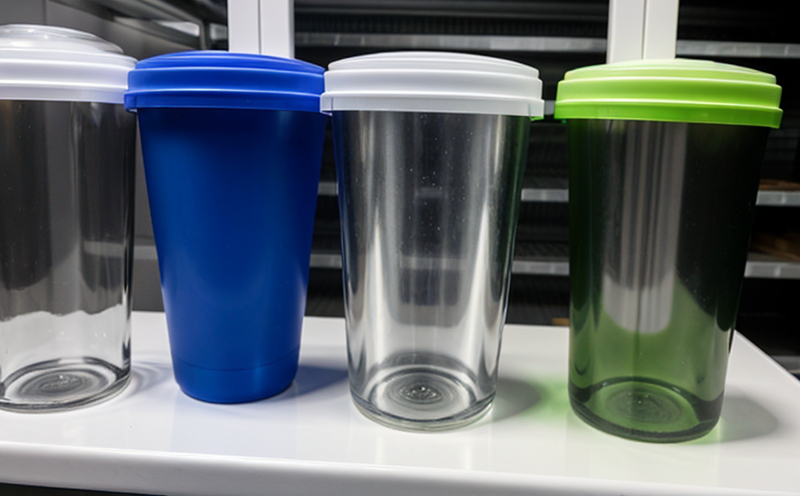ISO 1402 Glass Chemical Durability Testing
The ISO 1402 series of standards provides criteria for labeling products as environmentally preferable. Among these, ISO 1402-5 specifically addresses the measurement of chemical durability of glass packaging materials in an aqueous medium at elevated temperatures and pressures.
This testing method assesses how well a given glass packaging material resists chemical attack by common aqueous solutions encountered during storage and transport. Understanding this property is critical for ensuring that glass containers maintain their structural integrity over time, especially when exposed to harsh environmental conditions such as high humidity or acidic contents like fruit juices.
Our ISO 1402-5 testing service involves subjecting samples of glass packaging materials to a defined chemical solution at specified temperature and pressure conditions. Following exposure, we measure any weight loss or change in chemical composition that indicates degradation due to the chemical environment. This process helps manufacturers optimize their products for better performance under real-world usage scenarios.
Standardizing these tests according to ISO 1402 ensures comparability across different brands and suppliers, which is essential for maintaining consistent quality standards within the industry.
- Benchmarking: Enables companies to compare their products against established benchmarks set by international standards.
- Quality Assurance: Guarantees that all products meet high-quality criteria before reaching consumers.
The testing procedure follows strict guidelines outlined in ISO 1402-5, which specifies the exact chemical composition of the solution used for immersion as well as the duration and temperature conditions. These parameters are designed to simulate real-world storage environments where glass packaging is likely to be exposed.
Our laboratory uses state-of-the-art equipment capable of accurately measuring both small changes in weight and subtle shifts in material properties indicative of chemical durability issues. By leveraging advanced analytical techniques, we ensure precise results that can be relied upon by our clients for making informed decisions about their product development processes.
Why It Matters
Glass packaging plays a crucial role in protecting food and beverage products during distribution. However, it must also withstand various environmental factors that could potentially degrade its structural integrity over time. Understanding the chemical durability of these materials is vital for ensuring their longevity and effectiveness.
The ISO 1402-5 test provides valuable insights into how well a particular glass packaging material can resist degradation caused by common aqueous solutions found in storage facilities or during transport. This information allows manufacturers to select more durable materials, potentially extending the shelf life of packaged goods while reducing waste associated with premature failure.
Moreover, compliance with ISO standards demonstrates a commitment to sustainability and environmental responsibility, which is increasingly important for businesses seeking to build strong reputations among environmentally conscious consumers.
- Enhanced Reputation: Meeting international standards enhances brand image by signaling reliability and quality.
- Regulatory Compliance: Ensures adherence to relevant regulations governing product safety and environmental impact.
Benefits
- Informed Decision-Making: Provides critical data needed to choose the most appropriate glass packaging materials for specific applications.
- Potential Cost Savings: By selecting more durable materials upfront, companies can avoid costly replacements and repairs later on.
- Improved Customer Satisfaction: Longer-lasting products contribute positively to customer experience and loyalty.
- Competitive Advantage: Demonstrates leadership in sustainability practices among industry peers.
The results from ISO 1402-5 testing offer actionable insights that help companies improve their product offerings continuously. For instance, if a particular type of glass shows poor resistance to certain chemicals, manufacturers can explore alternative formulations or additives that enhance its durability without compromising other important attributes such as transparency or aesthetics.
Customer Impact and Satisfaction
- Increased Product Life: Durable glass packaging extends the shelf life of contained products, ensuring they remain fresh longer.
- Better Consumer Experience: Products that retain their integrity throughout distribution are less likely to break or leak, providing a superior purchasing experience for consumers.
- Reduction in Waste: Longer-lasting packaging means fewer returns and replacements, ultimately leading to lower waste generation.
For quality managers and compliance officers responsible for overseeing packaging operations, having access to accurate data on chemical durability is invaluable. It allows them to make informed choices regarding material selection and process optimization, thereby contributing significantly to overall business success.





